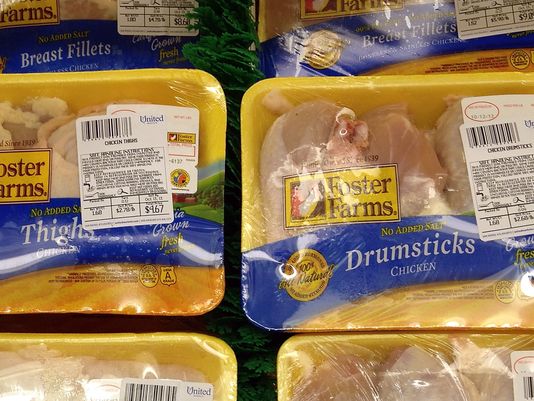The Department of Agriculture will not close the California chicken-processing plants linked to a nationwide outbreak of antibiotic-resistant salmonella, officials said.
"Foster Farms has submitted and implemented immediate substantive changes to their slaughter and processing to allow for continued operations," USDA spokesman Aaron Lavallee said Thursday evening.
USDA Food Safety Inspection Service inspectors will verify that the changes are being implemented at the three plants linked to the outbreak one "a continuous and ongoing basis," he said.
USDA inspectors will also do "intensified sampling for at least the next 90 days," he said.
Foster Farms has not recalled chicken from the three implicated California plants, however grocery giant Kroger Co. has. The company has removed Foster Farms product from those plants, said spokesman Keith Dailey. In addition, Kroger has pulled the chicken from Food 4 Less stores on the West Coast and Smith's in southern Nevada and New Mexico, Dailey said.
Foster Farms is not obligated to recall chicken processed at the three plants because USDA investigators have not yet been able to tie the outbreak to specific products and lots.
In a statement issued Wednesday, company CEO Ron Foster said, "It should be noted that while no illness is ever acceptable, the time period for this issue was over the course of six months from March to mid-September. During that time, more than 25 million consumers safely consumed Foster Farms chicken."
Foster emphasized that raw chicken is not a ready-to-eat product and that it "must be prepared following safe handling procedures, avoiding cross-contamination, and must be fully cooked to 165 degrees to ensure safety."
Public health officials concurred. Ron Chapman, director of the California Department of Public Health, said that he has not requested Foster Farms to recall chickens because, with proper handling and preparation, it is safe to eat.
"Chicken is a raw animal protein that is expected to have some level of naturally occurring bacteria present," Chapman said. If consumers cook it to 165 degrees, any salmonella bacteria in the chicken will be killed. "Provided that consumers do not cross-contaminate fully cooked chicken with raw chicken juices, it is safe to consume," he said.
Salmonella is presumed to be present and is acceptable in U.S. poultry under USDA rules. Up to 7.5% of chicken carcasses in a plant may test positive for the bacteria, according to USDA performance standards.
This outbreak differs in that the variety of salmonella is especially virulent.
There are seven strains of salmonella Heidelberg involved in the outbreak. Several of them are antibiotic-resistant and "one of the strains that we've tested is resistant to seven antibiotics," said Christopher Braden, director of the Centers for Disease Control and Prevention division of foodborne diseases.
Of the people infected, 42% have been hospitalized — an unusually high percentage, according to the CDC.
"That's about twice what we would normally see for a salmonella outbreak," Braden said. "We think that's at least in part due to the fact that a number of these strains have resistance to one or more antibiotics."
Thirteen percent of those sickened have salmonella septicemia, a serious, life-threatening, whole-body inflammation, Braden said. Normal for salmonella would be "just a few percent," he said.
There have been no deaths linked to the outbreak. "The outbreak is ongoing," Braden said.
Common symptoms of salmonella food poisoning include diarrhea, cramps and fever that typically start eight to 72 hours after eating food with high levels of the bacteria. Some people get chills, nausea and vomiting, lasting up to seven days, CDC says.
Foster Farms is one of the nation's largest poultry processors and sellers. Most of the chicken was sold in California, Oregon and Washington, and 77% of the illnesses have been in California, the CDC said.
Products from the three plants have these packaging codes: P6137, P6137A and P7632.
While salmonella is not considered enough of a contaminant that it is illegal, in the case of the Foster Farms plants, "the frequency and level of contamination on chicken parts coming out of the three facilities affected by this action is substantively higher" than on another Foster Farm plant the agency inspected, said Dan Englejohn, FSIS deputy assistant administrator.
The USDA notified Foster Farms on Monday that the company had 72 hours to inform the agency how it would clean up the plants.
In a letter on the company's website Wednesday night, CEO Ron Foster said, "On behalf of my family I am sorry for any foodborne illness associated with Foster Farms chicken." He said his staff is "continuing to work around the clock to fully address this situation."


